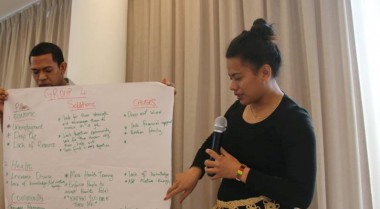Feminist Financing for Climate Justice starts with Us!
As more and more communities continue to feel the impact of climate change, there is a need to direct our focus to strengthening resilience at that level.
But when we talk about climate change and intersecting crises impacting communities, it’s important to be clear about who it is we need to hold accountable.
“We need to shift the power and dedicate investment in a generation that is inheriting the impact of the climate crisis to pave the way for a peaceful and inclusive future that transforms political commitments to lived realities.”
Demonstrating the power and potential of our collective leadership, members of the Shifting the Power Coalition also make up the GPPAC Pacific network—forged by diverse Pacific women and women’s organisations from Fiji, Papua New Guinea including Bougainville, Samoa, Tonga, Vanuatu, Australia, and the Pacific Disability Forum.
Through this Shifting the Power Coalition, the focus is to enable women with disabilities, young women-led organisations and rural and coastal women's networks to use our collective power, influence and leadership to drive the climate justice agenda forward. Yet, despite our persistent efforts, we can not do this alone. Therefore, our call is loud and clear:
“We’re calling on those that have caused the climate problem to pay their fair share of climate finance to those who are experiencing the worst impacts.”
According to the ActionAid report “Fairer Futures: Financing Global Climate Solutions”, Australia and other wealthy countries had “committed to mobilizing 100 billion USD per year by 2020 to support low-income countries adapt to the impacts of climate change and reduce their emissions.”
And as a Coalition, we’re saying that funding models must ensure that any local funding is supporting women's rights and women-led organisations with dedicated allocation for women with disabilities and LGBTQI community.
As local experts within our communities, we are best placed to decide what funding and resources will be needed to respond to climate change. What we need are the resources and support services that’ll enable us to be in key decision-making spaces, the technical expertise made available to understand climate products and information, the appropriate resources made available that’ll ensure we have the ability to deliberate, design, participate and lead programmes/community-based solutions that’ll work for us.
Resources must include access to appropriate information and communications systems. This means making information more accessible – saying the information is available on various websites and you can connect online for more conversations isn’t going to work for someone from rural communities where internet connectivity and infrastructure isn’t the best.
What we can do is continue to redesign the table and be intentional about who sits with us when it’s time to make a decision about what our next steps should be. It’s about asking those who occupy leadership spaces to make way for us as well. Use what leverage you have to broker space for others.
“As young women, we’re saying, listen to us and work with us to hold our governments accountable to the international commitments they make.”
We share a collective vision for an inclusive future that transforms to lived realities. It’s time to localize international and regional commitments.
Together we can shift the power by co-creating and sustaining spaces for intergenerational and cross-gender learning. It's together that we can strengthen our feminist movements, climate action and peacebuilding networks.
